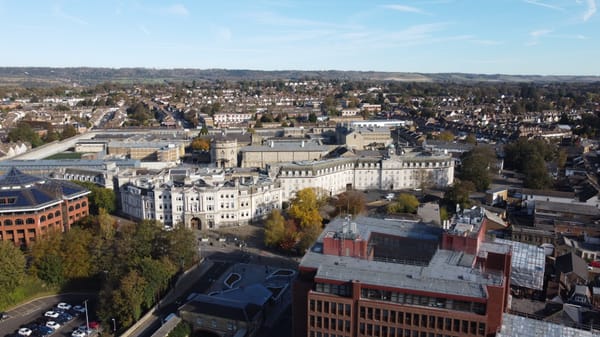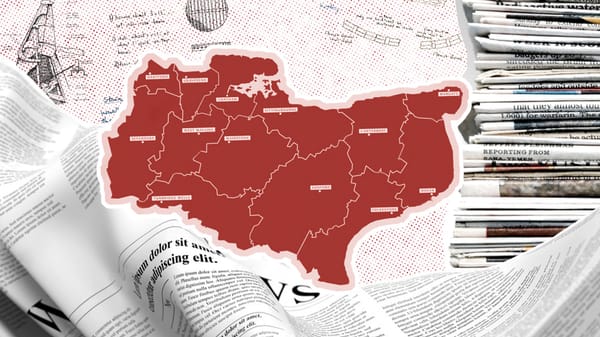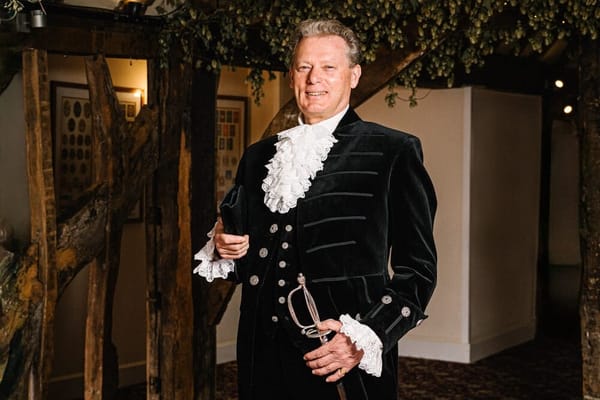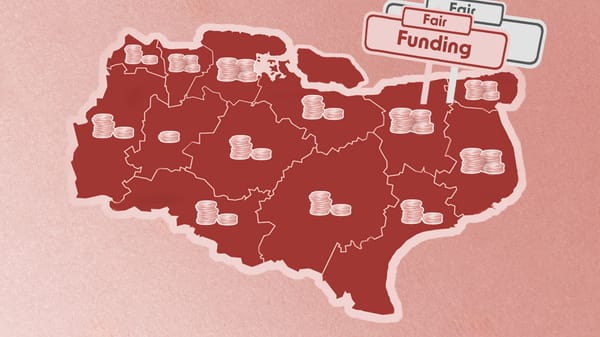Conservative leader Roger Gough on the coming local election
We discuss the upcoming Kent County Council election with Roger Gough, current Leader of Kent County Council and the Conservative Group.
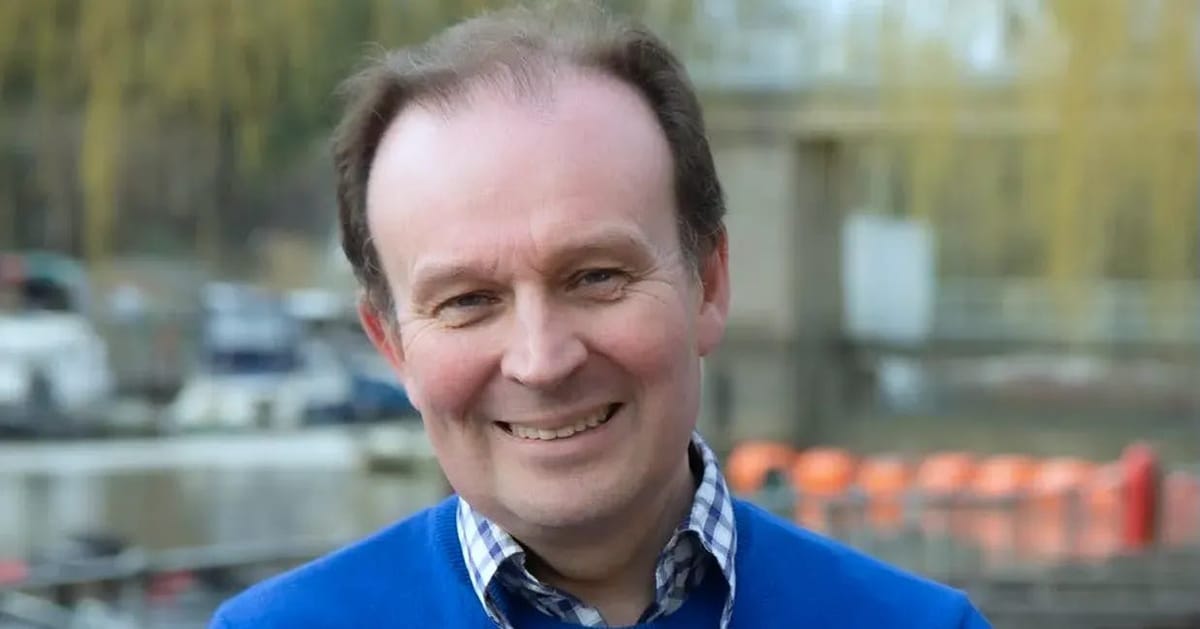
Editor’s note: This is the first in a short series of interviews with the political group leaders at Kent County Council, where we meet the candidates pushing to take control of the authority in May. Today, we speak to the Conservative leader of the council, Roger Gough. We’ll hear from Rich Lehmann of the Greens and Alister Brady of the Labour Group on Monday. Then, on Tuesday, it’ll be the turn of Antony Hook of the Liberal Democrats and Thomas Mallon of Reform UK.
Roger Gough is the Leader of the Conservative Group on Kent County Council, the party that controls the council with a commanding majority. With KCC elections approaching, some of the group have exited the party to move to Reform UK, independents, and even to the Heritage Party. Despite this, the Conservatives still remain the largest party by a significant number. We discuss the party, Kent devolution and reorganisation, and what success in the coming election looks like.
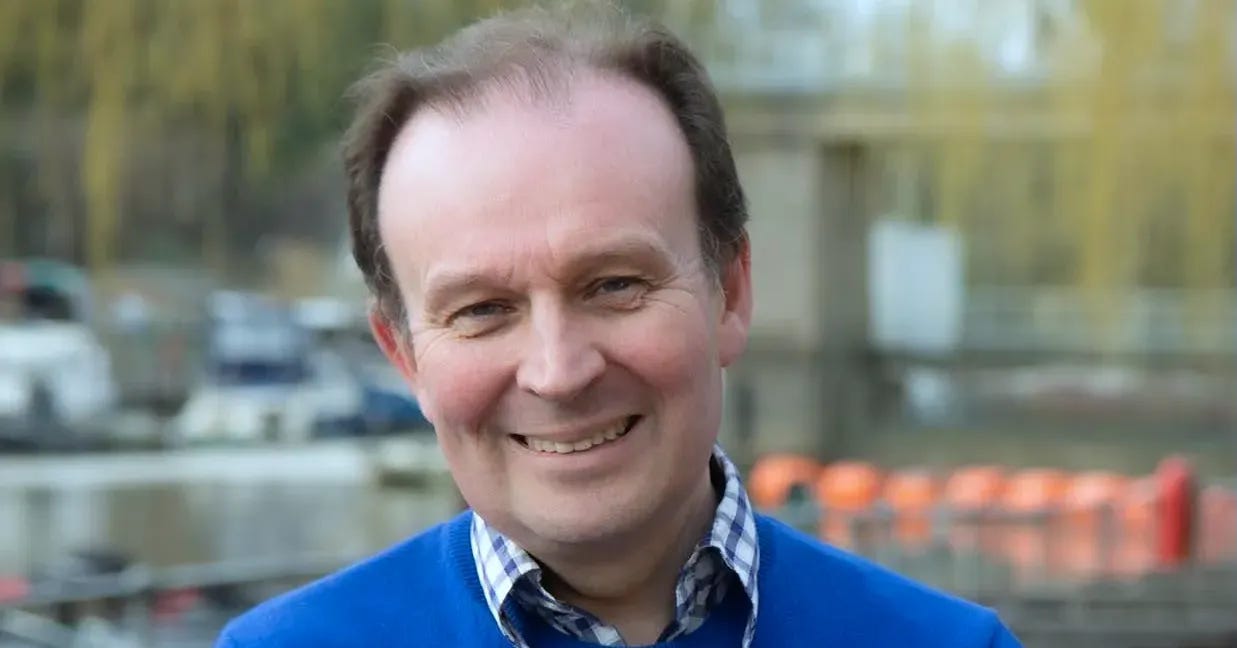
How would you describe the Conservative Party?
I think the Conservative Party is a party of the centre-right, so not far-right. One that has governed the country over a long period and, I think, has tried to have a reputation as the sensible mainstream party that will ensure that we can make progress as a country, but in an orderly and sensible way. Now, I think many critics of what's happened in recent years would say that we sometimes lost our way on that nationally, and I think that contributed to our defeat last year. But for us, we in Kent County Council, I think that's exactly where we try and position ourselves as people who will ensure that you can, in many ways, get on with your life without the government getting too much in your way, but absolutely be there when you need it.
How would you describe the group at the moment?
It's a big group, and I think that's always a little bit more challenging. I've been around the county council for a while, and I think historically it's always been a little bit more difficult because you have a bigger group of people all with their own ideas, wishes to do, whatever it is that they wish to, et cetera. I think it's a little bit harder when you have that. Having said that, I think we've come through together as a group some really, really tough times in the last few years. It's been tough times in local government all around. Kent has, doubtless we will come to this, one or two issues very specifically of our own, chiefly because of our geography. It's been really hard for us to try to manage that as the ruling group. I think we have come through that well. Many of our people I've known for a long time. There are people who give great public service and inevitably, it's very varied. We had 61 individuals elected in 2021. You've got a big variety within that. We’ve had some difficult moments, but on the whole, I think we've come through it well. Particularly recently, one or two situations where people have left the group, but it's still a very large group. I wouldn't overemphasise that.
It's been part of the commentary of the upcoming election about the number of people who are standing down. Does that number seem large to you, or do you expect that level of churn?
I think that we often historically have had quite a big churn. In fact, there was quite a big change over at the last election and has been through recent times. It is a bigger number this time. That is true. Now, partly, of course, we are still quite a big group. But also, I think there have been quite a number of people who've given quite long service and are reaching a point where they feel they wish to do something else. That, I think, has been the main factor in it. What is unfortunate at one level is that you lose some people with great experience and knowledge. You always want that balance, don't you? You want fresh insights, you want people coming in from other walks of life and bringing their experience and their ideas with them. You do lose something when you have people who are very experienced who stand down because we're a big complicated county council. Lots and lots of difficult things to get to grips with, and when people have that experience, it's an asset, but as I say, we will doubtless welcome many new members after May 1st.
What are the group's key focuses for Kent County Council?
Above all, I think it is steering the county through really difficult times and standing up for Kent regardless of who's in power nationally. Our focus has been very much on firstly ensuring that the council protects our services but meanwhile ensures that we actually have a strong financial position. That's been a huge challenge in the last few years because, and again, this is true of local government generally, you've got a lot of areas like adult social care, children's services, special educational needs, where there's been big, big pressures put on the budgets. That means it is very difficult to balance the budget and protect your services, but we feel we've done a strong job in that area. Many councils have fallen by the wayside in the last few years. We have not.
I think a big priority is to ensure that those services for vulnerable people are both good and sustainable. I think we've made big progress, done very well on things like children's services. OFSTED considers them outstanding, and they have some of the lowest cost associated with children's services in the country. That's no small achievement. We are working to bring about big changes in our adult care and special educational needs, which is an area that we struggled with unquestionably, as many councils have. We've brought about a big programme of change. Again, I think that is starting to bear fruit. Getting those services, which matter a lot to many of the most vulnerable people across the county, on a sustainable basis, that's really important.
I think also ensuring that we do everything we can when the occasion arises to protect Kent from some of the challenges we face, particularly because of our geography. We have had, throughout this time, the aftermath of Brexit and then the European Union bringing in its external frontier. We put in a huge amount of work to prepare for that because the risk was if that went wrong, the county, particularly in the east, would be gridlocked, and we worked really hard to prepare for that. That's still ongoing because the European Union put that back in the end. They deferred it. And of course, we receive large numbers of asylum seekers. That's not chiefly within our gift, we don't make national policy on that. The unaccompanied minors, the under-18s, come into our care. We have fought very, very hard to make sure that the Kent council tax payer is not on the hook for that, that we got a fair settlement of that from government. We ensure that these young people are placed across the country quickly, which has been essential given the numbers who have been arriving. On that, as I say, frankly, we will stand up to whichever government it is, including our own. We took a government of our own party to the High Court and won because they weren't doing enough to move those young people on from Kent. We succeeded in that. We will stand up for Kent's interests.
I think it's always very important also to manage whatever pressures there are coming out of housebuilding and other forms of growth. Now, we think that the targets set by government for housing in Kent are too high, particularly in some parts of Kent. But what is most important is to ensure that where there is that, that we make sure that the developers pay as they should for the infrastructure that is needed. We are extremely robust about that. We've achieved, I think, 97 % of what we asked for over recent years, and we're willing to fight those things when they're needed. That's a few of the things that I think are really, really important. And just keeping this county as great, diverse, and beautiful as it is.
Should 16-year-olds have been allowed to vote in local elections?
I've not been particularly in favour of that. We've looked at it a number of times over the years. It's not, to be honest, an issue on which I have a particularly strong view, but I'm probably in favour of keeping it at 18.
Would Kent County Council benefit from proportional representation?
No, I don't think so. I think what will be interesting actually with the election we have coming up is that we have a multi-party contest here, we will see some very interesting outcomes, but historically, this delivers clear government, clear majorities for a particular party. It's tended to be us, but it need not always be the case. On that basis, we can govern. We will make a big effort to do so responsibly and not seek to make overuse of the big majority we've sometimes had. I think it's very important actually that we hear the voices of opposition parties of all members. We've very much tried to do that.
How much should KCC support unaccompanied asylum-seeking minors?
Well, we have a set of legal obligations. It's actually under the Children Act, enacted with something completely different in mind. It was all to do with services to children in care. But because of the way that our system works, we are required to do that. My view is we discharge our obligations. We do so in a decent and compassionate way. But it's very important to ensure that Kent does not bear the burden unfairly because of our geography. As I've said, we have ensured that the government pays for those services because this is a national problem. In some ways, it's an international problem, and we have ensured that the Kent council tax payer is not on the hook for those services, and it's very important that they're not. We've fought very hard for that.
Those young people, as they arrive, many of them are moved on to other parts of the country because, again, Kent should not take a hugely disproportionate share of that pressure on our services, on our fostering and residential capacity. We've been successful in that. We were prepared to judicially review a government of our own party, take them to the High Court to ensure that that mechanism, what's called the National Transfer Scheme, works effectively. Still not as good as I'd like. Still not moving as fast as I would like, but it's moved a heck of a lot in the last few years. We have deliberately pushed for that very hard. We will discharge our obligations, but we will fight very hard to ensure that Kent does not take a disproportionate burden. Anything else in terms of asylum is ultimately a matter for national policy and its national government, which has to address that. We have to operate within the situations we find it.
Has KCC done enough with regards to climate change?
We believe that we are, and we continue to. We actually have a rather proud record in this regard. We are working to bring our estate and the emissions from our estate and operations into being neutral by 2030. Now, we've already reduced those emissions by about half since 2019. In fact, even before 2019. 2019 was when we set that target. We'd already reduced it beforehand. Sometimes, by doing things that make a lot of sense for other reasons, too, like adopting LED lighting, which gave us a great deal of both savings and carbon reduction. We think that is an important area.
The environmental stewardship that we have in Kent is really important too. We're just bringing forward what's called the local nature recovery strategy, or the name we've given it is Making Space for Nature, to ensure that we protect all the amazing natural resources we have in the county. We have brought out what we call Plan Bee, which has been with us about 10 years now in terms of helping pollinators, followed by Plan Tree, which is about planting one and a half million extra trees across the county and a whole range of other initiatives.
The other thing which I think is pretty important is this. We know that, of course, we can do our part on this, but we are only one small part of the country, which is one small part of the world. What will happen in terms of climate change will happen on a much bigger scale or result in much bigger decisions than anything that we can take. Whilst we very much do our part, we're also developing a lot of plans for adaptation, recognising that regrettably, I think an element of climate change is baked in and certainly will happen for reasons which are not certainly of our particular making or our decision or within our scope for decision. It's working out those plans to address what the consequences of that will be for our roads, for our buildings, for our services as we look forward.
How should KCC be devolved?
I'm very keen we get the mayoral devolution which the government offered. Frankly, I was appalled, trying to find the right words for this actually, but certainly appalled and astounded that back in February, the government came to the conclusion that devolution would come to every county around the southeast, from Norfolk all the way around to Hampshire, except for Kent and Medway. There was no reason for that. Government gave a reason to do with the fact that Kent and Medway were very different sizes, but frankly, that makes no sense because, for one thing, they knew that quite some time ago, and we were working with government to strongly bring forward our devolution proposition and with a lot of encouragement, and it appeared to be going very well. If that was an issue, it didn't emerge until the last minute, and also, frankly, you could say the same about some other areas. I don't know why we didn't get it.
But the reason why I've been keen on devolution and this approach is this. This is true not just of Kent but of county councils and other councils like them across the country. Because there's so much pressure on us in those big spending areas, adults, children, special educational needs, councils have not had the capacity, the money, the headspace to be able to do the really big strategic things that help shape an area in terms of infrastructure, economic development, big environmental activity, all those things. It's pretty clear that what government was offering gives at least the beginnings for having funding, powers, national voice, to be able to shape those things in a different way. That's what I wanted for Kent. It's what I still want for Kent. We had a very good proposition. I don't know why we didn't get it, but I'm keen to get it back on track, and we continue to talk to government about this, to have a clear timeline on when we're going to have a devolution. Meanwhile, of course, there is local government reorganisation that moves ahead anyway. That's a linked but slightly separate area.
Do you have a preference of the four maps that have been suggested?
I have a starting point for it all, which is that our biggest responsibility in all this is not to set up councils that will fail. There are very tough times ahead over the next few years for councils for all the reasons we've talked about. Local government reorganisation in a county like Kent is not the same as in a smaller county, where in effect you just bring everything into one organisation. That way does deliver you quite a lot of savings. In Kent, because you'll be actually breaking up, disaggregating many of the big services that we have: Adult services, children's services, those sorts of areas, you've got to watch out that you don't end up actually costing yourself money rather than saving it. Clearly, delivering that change is also really difficult because you've got to hand over all those services, which are a matter of life and death for some people and a matter of great importance for many others, in a safe way.
I think that leads me towards a smaller number of unitaries rather than a larger one, but I'm open to evidence as to what best delivers those sustainable councils. As things stand at the moment, my personal view, and I must emphasise this, is that the three (unitaries) model works the best. But above all what drives me in this is I will not have, so long as I have anything to do with it, part of our legacy that we set up councils which failed.
It's taken everything over a bit. We've got a challenge, of course. We've got to keep all the business as usual going. As usual, as I say, is really important things: It's social care for vulnerable people, it's child protection, it's keeping our highways safe and running well, and many other things besides, all of which we've got to do whilst contemplating this really big program of change.
If you could change anything about Kent politics, what would it be?
I think what I would love to see is an ability to get across to the people who we represent and the people who pay their council tax, which keeps us all in our roles, what it is we do and being able to deliver something very visible to them. Because I think the great challenge we've got is people pay council tax, it's a very visible tax, and it goes largely to fund services which are invisible to most people. Therefore, it's very hard for people to get a sense of, ‘Am I getting value for money or not?’, particularly when those services are also under such severe financial pressure. I think that's the really hard thing.
In terms of how politics itself is conducted on the whole, I think we try to be courteous. There will be, sometimes, quite fierce debates, and that's absolutely as it should be. People are elected to, in this case, county council because they want to make a difference. They want to put forward what they believe to be the right thing. There'll be some sharp differences on that, and we won't always agree, and that's fine. But if we can find ways, which most of the time we do, to debate those things sensibly and with that sense of shared purpose, I think that's for the good. But overall, I don’t have a particular problem with how we try to conduct politics. I think we have a very, very big problem indeed, or almost a democratic problem of people getting a clear picture of where their money goes and what we are all actually paying for, because I think that's a really serious problem. People don't know, ‘How can we judge this?’ Can we know if we're getting good value for money? Where do we understand where that money goes?’ I think that's a huge, huge problem. If I could find a way to get that better addressed, I'd be a lot happier.
Well, we'll see what we can do.
Can I just say actually, without wishing to sound too cheesy, but doing what I think you've indicated you want to, which is to have some serious discussion about these things, I think can only help because there is a world out there as we all know of clickbait and the rest of it, and it doesn't help. It doesn't help our politics, doesn't help politics anywhere really, but it's to some extent an element of life now. Complaining about it is like complaining about the weather. But if we've got some other things that counterbalance that, I think it's brilliant.
Can we expect your party leader to be in Kent to support the election campaign?
I don't know, to be honest. I think we certainly will have members of the shadow cabinet and so on, and clearly, I'm delighted with any representative of our national party, including the leader, who comes to us. She was briefly in Kent not very long ago and was with some of our colleagues who are running for re-election. Of course, we're delighted always to have the party leader and, indeed, our colleagues from parliament and from the shadow cabinet.
As the larger party, what will success in the KCC election look like for the Conservative Group?
I don't wish, to be honest, to set myself up on a benchmark which could prove either too low or too high. Clearly, we're going to fight for a strong result. I think we all know that these are very complex and challenging political times. I just look at the national opinion polls to know that. But I think it will be a case of can we get our message across. Making any predictions is very, very hard because we had today the statements of persons nominated and certainly in my division, we've got five candidates, all from the parties that you might imagine, and you can well see situations, and there'll be some independents and so on in other places. It's quite a complicated landscape, and we know too that, not just in Kent but across the country, and in fact across the wider advanced world, there is much more questioning of and challenge to and disenchantment sometimes with political parties that have been around for a while. These are very difficult times. I think we've got to just get our message across of what it is that we have been doing, why we do it, what we offer to people in Kent in the future and beyond that. We will just have to see what comes out of those ballot boxes on the 2nd of May.
Footnotes
This interview has been lightly edited for length and clarity.
You can read our previous interviews here.
If you want to suggest ideas or send tips for people to interview, email Steven.

